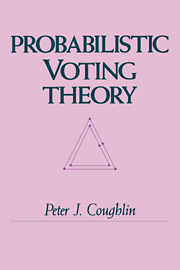Book contents
- Frontmatter
- Contents
- Acknowledgments
- 1 Majority rule and models of elections
- 2 Income redistribution and electoral equilibria
- 3 Properties of the redistributional equilibria
- 4 A more general election model
- 5 Concave social and candidate objective functions
- 6 Directional, stationary, and global electoral equilibria
- 7 Epilogue
- References
- Index
4 - A more general election model
Published online by Cambridge University Press: 05 November 2011
- Frontmatter
- Contents
- Acknowledgments
- 1 Majority rule and models of elections
- 2 Income redistribution and electoral equilibria
- 3 Properties of the redistributional equilibria
- 4 A more general election model
- 5 Concave social and candidate objective functions
- 6 Directional, stationary, and global electoral equilibria
- 7 Epilogue
- References
- Index
Summary
Theorem 2.2 (the equilibrium existence theorem) and Theorems 3.1–3.7 were all concerned with the implications of using a logit model to specify the candidates' beliefs about the voters' behavior in an election with redistributional reputations. In this chapter, the special assumptions that came from using a logit model and studying the problem of income redistribution with selfish voters will be generalized to make it possible to derive results that apply more broadly. In particular, the assumptions about the set of possible locations for the candidates and the candidates' expectations about the voters' choices will be replaced by less demanding assumptions. These alternative assumptions are identified in Section 4.1. The fact that these assumptions are generalizations of their counterparts in the premises for Theorems 2.2 and 3.1–3.7 is also established in that section.
Once the generalizations are made, a number of the assumptions used in Chapters 2 and 3 become obsolete for our subsequent analyses, in the sense of being possibilities that are covered without having to be explicitly assumed. To be sure that there is no confusion about exactly which assumptions from the earlier chapters are retained in full and which are subsumed, Section 4.2 provides a complete statement of all assumptions that are in the model that results from making the generalizations in Section 4.1. This explicit statement of the resulting model is also useful because it emphasizes that the resulting model can be stated more succinctly than the model it subsumes and because it makes it easier for the chapter's results to (potentially) be used in alternative applications.
Information
- Type
- Chapter
- Information
- Probabilistic Voting Theory , pp. 87 - 118Publisher: Cambridge University PressPrint publication year: 1992
